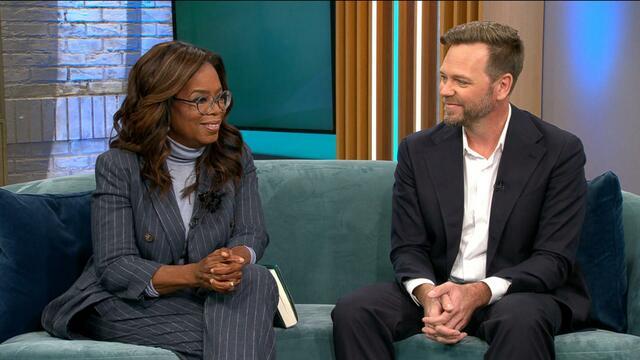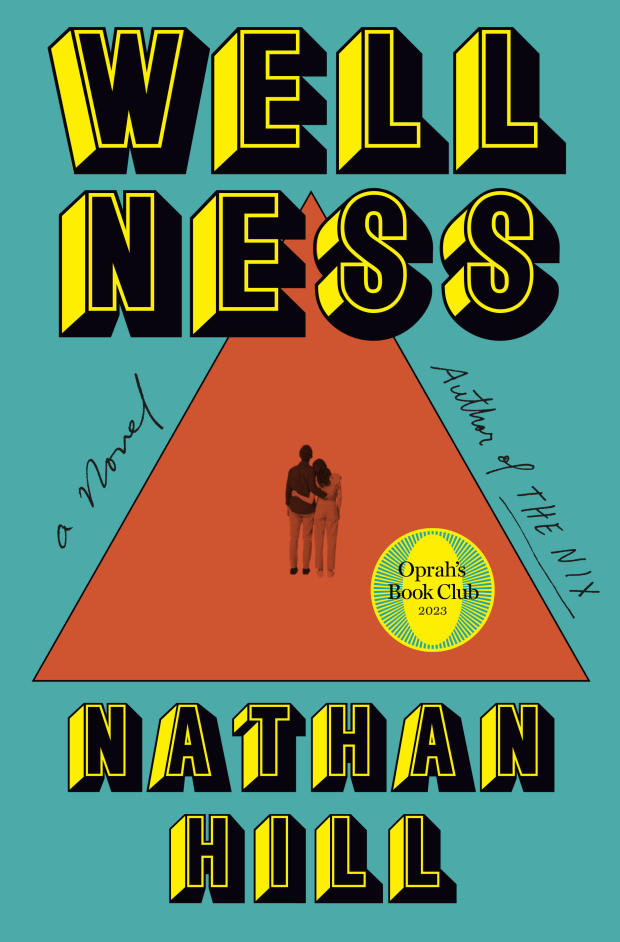▶ Watch Video: Oprah talks new book club pick, “Wellness: A novel,” with author Nathan Hill
Oprah Winfrey has selected “Wellness: A novel” by New York Times best-selling writer Nathan Hill as her newest book club pick.
“Wellness: A novel” looks at a 20-year relationship between Elizabeth and Jack, from their initial meeting as lonely students in Chicago in 1993 to their turbulent marriage in 2014.
The questions, discussion topics and other material that follow are intended to enhance a group’s conversation of Hill’s love story that explores the ways science, art, religion and culture shape the stories people tell themselves — and one another — and therefore shape the realities in which we live.
Follow along with the reading schedule at OprahDaily.com.
Purchase below to read. Prefer to listen? Audible has a 30-day free trial available right now.
“Wellness: A novel” by Nathan Hill
“Wellness: A novel” by Nathan Hill (hardcover), $21
“Wellness: A novel” by Nathan Hill (Kindle), $14.99
Reading Group Guide by Nathan Hill
Questions and Topics for Discussion
1. Have you ever been under the placebo effect — in a medical or other context? After reading “Wellness,” can you look back on certain events, decisions or changes that took place in your life and attribute those changes to belief alone?
2. Dr. Sanborne’s theory of love is one explanation for why Jack and Elizabeth were attracted to each other (including the intimacy questionnaire that Elizabeth uses on their first date). Can you think of any other theories or explanations — from psychology, popular culture or other traditions/systems — for how their relationship unfolds?
3. Which of the wellness trends mentioned in the book (Benjamin’s diets and supplements; Jack’s failed workouts; Elizabeth’s and Lawrence’s various healing potions, etc.) have you heard of or participated in? Did they produce the desired effect? Do you believe now, and did you believe then, that the product(s) or technique(s) “worked”?
4. Do you believe that Elizabeth and Jack are soulmates? Do you believe they believe they are? How does their own version of their love story change over time?
5. When Elizabeth and Jack discuss marriage on their first date, she says, “They say that marriage is hard, but it seems to me if it’s that hard then you’re probably doing it wrong” (page 36). If someone had said that to her later in the novel, ten years after they met, what do you think she’d say — are they “doing it wrong” because of their challenges?
6. What did you make of Toby’s explanation for why he ate the first apple turnover when Elizabeth tried the marshmallow experiment on him? What does this exchange reveal about the assumptions we make from scientific experiments, even when the results are “statistically significant”?
7. Discuss Elizabeth’s “unraveling” in the grocery store. Has anything like this ever happened to you? Which stressors that she was responding to seem unique to the present moment of the novel, and which are more universal to motherhood/parenthood?
8. Kate and Kyle seem to “diagnose” the problems in Jack and Elizabeth’s marriage fairly quickly at the Club. Why do you think they were so blind to their oppositional, enabling qualities? Do you think they knew those truths all along?
9. How might Jack’s art have developed if he hadn’t gone to art school, where he was introduced to a much more commercial and intellectual approach to art than what he learned from Evelyn?
10. Are there works of art that, like American Gothic does for Jack, evoke certain personal memories or identities for you? If so, which pieces and why?
11. Jack interprets the history of landscape art — especially of the plains — to mean that “the things we think are beautiful are only the things that have been depicted beautifully. And if it’s not depicted, it’s not seen. It never enters the imagination. It becomes a nothing” (page 209). How does this manifest in his own art, as it does (or does not) represent his grief and guilt over Evelyn’s death? Does his nonrepresentational style make Evelyn’s memory more or less of a “nothing”? Consider the images placed throughout the novel meant to illustrate Jack’s art.
12. Elizabeth’s ancestors use a variety of tactics to get ahead in business — mostly manipulation. In what ways do these men embody the plight of America? Is their work any different from the landscape artists Jack looks up to?
13. How do art and science intersect in the novel? Consider the strategy and motives behind Jack’s non-photos and the creativity of Elizabeth’s placebo experiments at Wellness.
14. What is the difference between the affirmations that Brandie’s Community Corps believe in and Elizabeth’s placebo work at Wellness?
15. How does the city of Chicago change and transform over the course of the book? What inspiration do Jack and Elizabeth take from this place where they emigrated to, to dissolve their connections to their hometowns?
16. Benjamin predicts that the internet — specifically hypertext — will free readers “from the hegemony of the book” (page 311); on the internet, “there’s no gatekeeper. No overlord telling you what to do. You pick your own way through the story, navigating a sea of information, constructing personal meaning out of a big constellation of meanings” (page 312). Does the novel suggest this is true, or do people make grand meanings of their lives even without the internet? What forms and media do these stories unfold in, and how are they shaped by the internet? Consider Jack’s entrée into photography and Lawrence’s attempt to seek connection after his cancer diagnosis.
17. Why is Jack so troubled when he sees that the theories of art and society he prescribed to as a young man have been adopted by his father in his Facebook screeds?
18. What is Lawrence looking for on Facebook? What might have happened differently if he hadn’t encountered Jack on the platform, friended him, and then was unfriended by him?
19. What do you think really happened to Evelyn the night she died — who was to “blame,” Ruth or Jack? Did she seem to prophesy her own demise?
20. Consider Jack’s reflection on his tattoo — and the nature of the self: “He realized that his current self—which seemed to him pretty stable and suitable and more or less true—was no more true than his younger self. Someday another person would emerge, a total stranger, and around him new friends would emerge and a new city would emerge and a new wife and a new son would emerge and they’d be an entirely new family” (page 408). How are Elizabeth and Jack totally different by the end of the book? What parts of them remain the same?
21. Though they have very different material upbringings, Jack and Elizabeth seem to play similar emotional roles in their families — especially regarding the ways Jack’s mother and Elizabeth’s father deal (or fail to deal) with their own insecurities. How do these roles play out in their marriage, in their work lives, and as parents? What coping mechanisms do you image Toby developing in response to his parents’ personalities? Consider Elizbeth’s reflection: “This, it turned out, was the most savage, most hurtful thing about being a parent: it wasn’t just coming face-to-face with all your own shortcomings and inadequacies, but it was also seeing those shortcomings embodied in your child” (page 175).
22. What was the impact of learning more of Jack’s and Elizabeth’s pasts later in the novel, as opposed to in the beginning? How might your impressions of them been different if you knew their childhood stories earlier?
23. Per Toby’s Minecraft universe, “Diamond was the strongest stuff there was, sure, but sometimes the made-up things [netherine] were even stronger” (page 589). Where does this idea prove to be true in the novel — and in your life experiences? What does this suggest about the value of both art and the placebo effect in supporting our human Frailties?
Suggested Further Reading
Pride and Prejudice by Jane Austen
The Circle by Dave Eggers
The Marriage Plot by Jeffrey Eugenides
Fates and Furies by Lauren Groff
The Nix by Nathan Hill
Hello Beautiful by Ann Napolitano
The Overstory by Richard Powers
Hope by Andrew Ridker
Normal People by Sally Rooney
Lake Success by Gary Shteyngart
Commitment by Mona Simpson
My Name Is Lucy Barton by Elizabeth Strout
A Spool of Blue Thread by Anne Tyler
Tomorrow, and Tomorrow, and Tomorrow by Gabrielle Zevin



































